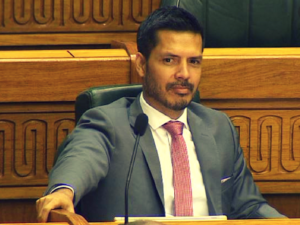SUNDAY TIMES EDITORIAL: By The Fiji Times editor Fred Wesley
If there is a rise in robberies in some of Fiji’s urban areas, then something must be triggering it. Unless this is the norm, and robberies are part and parcel of life in these urban centres, something is amiss, and we need to get to the bottom of what’s causing it.
Residents along Raiwaqa’s Falvey Rd, we learn, are living in fear as robberies in the area have become an almost daily occurrence. Biren Pal, 61, a resident of the area for more than six decades, claimed robberies and assaults were a norm.
Last Sunday, Mr Pal was robbed and, in the process, was severely injured in the face when thieves mobbed him before fleeing with his mobile phone. He was walking to a friend’s house when he was pushed to the ground and knocked unconscious.

He only regained consciousness when his friends took him to the hospital. Southern Police Commander SSP Wate Vocevoce confirmed receiving a complaint from Mr Pal.
He said in the past four months crimes committed in the area included four cases of assault, one of burglary and property damage and one case of theft.
In the Lagilagi area in the past six months, police recorded 14 cases of assault, one case each of theft, assault, intimidation, and trespass and two cases of property damage. Now such robberies and assaults on people are harmful for many reasons.
Aside from the pain and suffering it causes people like Mr Pal, there is the negative impact on life itself for those living in the area for instance.
Fear, uncertainty and doubt
There is fear, uncertainty and doubt cast over the area because of the actions of thugs.
The ripple effect on businesses in the area is felt by everyone connected to it.
And we are talking about stores operating in the area, shoppers, staff of these stores and residents living in the area.
There is a sense of fear that may stick to the area because of the robberies.
People will eventually hesitate to travel through the area, to shop there, or visit family and friends for instance. It breeds doubt, with only the brave who are willing to take their chances, visiting it.
When High Court judge Justice Daniel Goundar sentenced a 19-year-old casual labourer for stealing a mobile phone recently, he mentioned that muggings were prevalent.
In the Western Division, we learn that theft, assault, and burglary were among the most reported crimes in the division in the month of August.
Decrease in overall crime
Divisional police commander West senior superintendent of police (SSP) Iakobo Vaisewa said while these criminal acts were at the top of the list, their division has noted a decrease in the overall crime rate though.
“Even if the smallest item is stolen, they are investigated,” he said.
Now that’s a good thing because how else are we supposed to fight this? We look up to the police force to put in place measures that will empower people to assist it in the war against crime.
Fiji needs people who are willing to put their hands up and accept responsibility for their actions. In saying that, we look up to the powers that be to lead the way.
However, it is obvious that we need a united front.
The flip side to that is more crime, and more uncertainty, insecurity, fear and doubt! And those who assault and rob people need to get a life!
This editorial was published in Fiji’s Sunday Times today under the title “We need to work together”. Republished with permission.
